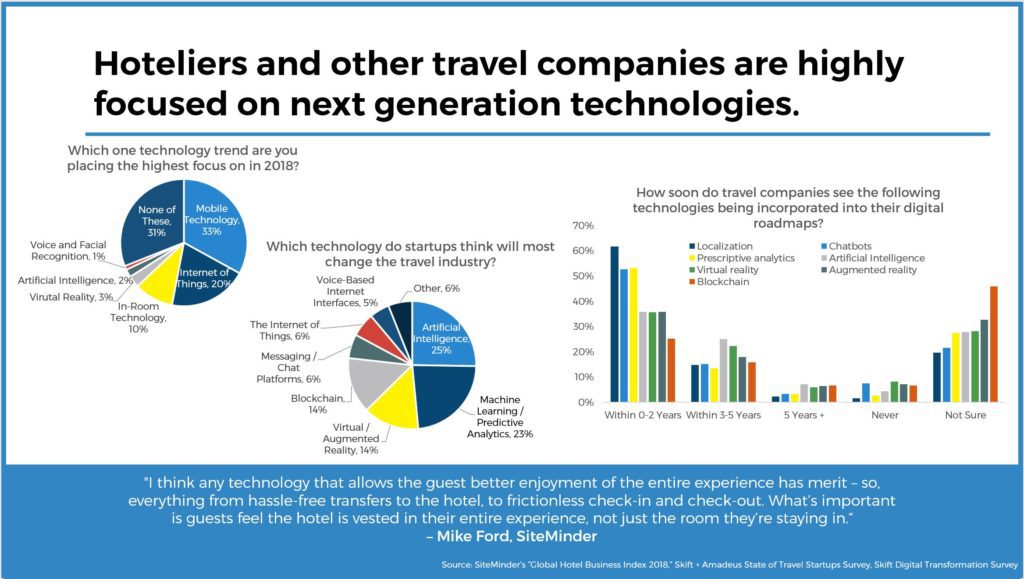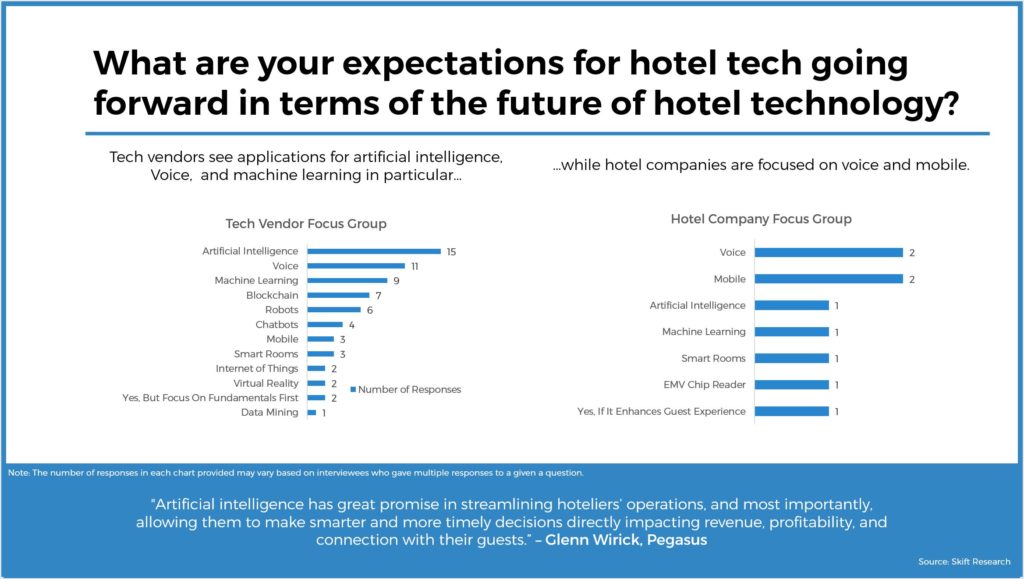Skift Take
The hotel industry needs to catch up with the times when it comes to technology, and we're not just talking about cloud offerings and software-as-a-service technologies. The smart hotelier of today is investing in next generation tech capabilities such as artificial intelligence, machine learning, voice capabilities, virtual reality, robotics, and more, but all with the guest experience in mind.
When it comes to technology, a lack of integration and the resulting data fragmentation remains the biggest challenge for hoteliers. It is true that hospitality is behind relative to other industries when it comes to cloud offerings and Software-as-a-Service technologies. However, the smart hotelier of today is trying to be wherever his or her guests are and investing heavily in the back-end as well as front-end technologies to provide seamless services.
For our latest research report, The State of the Hotel Tech Stack 2018, we interviewed 23 industry stakeholders — from tech vendors and online travel agencies to hotel brands, independent hoteliers, and hotel management companies — to understand the constraints of existing hotel tech and the possibilities when hoteliers make the right tech investments. We bucketed these interviews into two focus groups — our “Tech Vendor Focus Group,” which includes 18 tech vendors and one online travel agency (OTA), and our “Hotel Company Focus Group,” which includes two major hotel brands, one independent hotelier, and one hotel management company.
Throughout the report, we provide their answers to key questions with regard to hotel technology. We include responses to one question, “What are your expectations for hotel tech going forward in terms of the future of hotel technology, whether that is artificial intelligence, voice search, payment privacy/security, robots, etc.?” in the excerpt below.
We believe hoteliers should update their technology roadmaps to focus on the customer journey — from planning, searching, and booking, to the actual stay at the hotel, and through the post-stay experience. They need to think about technology in terms of how it can enhance the ultimate business goal: provide a wonderful customer experience for guests.
Last week we launched the latest report in our Skift Research service, The State of the Hotel Tech Stack 2018.
Below is an excerpt from our Skift Research Report. Get the full report here to stay ahead of this trend.
Hoteliers Need to Invest in Next Generation Technology Soon, but Wisely
Despite challenges with hotel technology, we are seeing some recent introductions of next generation technologies that are interesting and exciting.
For example, Hilton’s new robotic concierge, Connie, uses artificial intelligence to assist arriving hotel guests, altering the guest experience. Google Voice and Amazon’s Alexa offer interesting ways that guests can search for information, ask for help, or control in-room experiences.
SiteMinder’s Global Hotel Business Index 2018 found that more than two-thirds of hoteliers are focused on some next generation technologies in 2018, whether that’s mobile technology, internet of things, in-room technology, virtual reality, artificial intelligence, or voice. Skift’s research and survey work have found that many travel companies see themselves incorporating next generation technologies into their digital roadmap in the next couple of years and most travel startups believe artificial intelligence and machine learning will most revolutionize the industry (See exhibit below).
With many travel companies either focused on or adopting new technologies, hoteliers need to invest in emerging tech sooner rather than later if they want to be leaders in the industry.
Preview and Buy the Full Report
Nevertheless, any investment made in next generation technologies needs to be made wisely and in-line with business goals.
“Many people are forgetting that before we all jump on the AI, blockchain or robotics wagon, we need to deal with the hotel tech fundamentals first,” Max Starkov of HEBS Digital said. “Optimize the hotel direct channel, fix the six-year-old hotel website, get a better CRS [central reservation system] and WBE [web booking engine], improve the hotel SEO [search engine optimization], create the property’s Google AMP [accelerated mobile pages] presence, launch the property multichannel marketing, optimize the social media profiles, get better business intelligence and analytics tools, finally do something about CRM [customer relationship management software] to better engage and retain customers, etc.”
Michael Bennett of Cendyn added, “If we want to explore the opportunities we’re seeing in other industries, we’ve got to get what we’re doing now right.”
Ultimately, the place for these emerging technologies will lie in how they are used to enhance the overall guest experience, improve personalization, and offer capabilities that guests are truly looking for. However, we expect a human touch will always be required.
Bzdawka explained Hyatt’s strategy when it comes to new technology: “At Hyatt, we focus most on what guests want, rather than get distracted by a new offering or shiny new object. ‘Just because we can, does not mean that we should’ is a motto we sometimes use in IT to help keep us focused on employing empathy to understand guests’ needs, and then evaluate the solutions to support those needs.”
Preview and Buy the Full Report
Applications for Next Generation Technology: Focus Group Views
We asked our Tech Vendor and Hotel Company Focus groups, “What are your expectations for hotel tech going forward in terms of the future of hotel technology?”
Many respondents called out the fact that they could see explicit applications for a number of next generation technologies in the hotel arena.
We highlight a few things that individuals said with regard to different capabilities below.
Artificial Intelligence (AI).
“AI has the potential to greatly impact our ability to understand and personalize the guest experience. There is so much data in travel, and with AI we will be able to understand and use that data to create experiences that match our guests’ expectations and anticipate their needs. With this foundation, all the other ‘frontier’ technologies such as payments, robots, and our favorite, voice, will be much more powerful.”
– Alex Shashou, ALICE
Machine Learning and Chatbots.
“We use machine learning to understand sentiment and text analytics … The way I see this happening is that while the in-person interactions will continue to be important, we’ll start to see customers begin their interactions through some of these features [chatbots], [so] you get some of the basics answers right off the bat and that saves costs down the road.”
– Geoff Ryskamp, Medallia
Voice.
“I think voice will play a big role in the near future. Just think about how you use your smartphone today. I rarely type out a text message and almost always use voice. I ask my phone the weather, directions, to make phone calls. Why can’t I stand in front of a kiosk and asked to be checked-in, swipe my credit card and get my room key if that’s my preferred check-in method?”
– Connie Rheams, Beekeeper
“Voice, as a channel, offers a new way for hotels to interface with their guests … Voice technology also has a great future for the in-room experience as well, allowing guests to easily order everything from extra towels, to spa services and room service.”
– Susan Spinney Corlett, Expedia Group
Virtual or Augmented Reality.
“There are many exciting technologies that we expect will impact hospitality in the years ahead. Think about what augmented reality could do for booking more travel shoppers looking for unique experiences.”
– Jeff Robertson, NAVIS
Robots.
“There are some really cool products on the market … that can add value to hotels and, ultimately, guests. Take the example of a robot that delivers towels to guest rooms.”
– Scott Schaedle, Quore
Blockchain.
“It is still a bit early to predict exactly what it’s role will be, but blockchain technology holds a lot of promise in payments, identity, security and even possibly distribution technology.”
– Glenn Wirick, Pegasus
Subscribe now to Skift Research Reports
This is the latest in a series of research reports, analyst sessions, and data sheets aimed at analyzing the fault lines of disruption in travel. These reports are intended for the busy travel industry decision maker. Tap into the opinions and insights of our seasoned network of staffers and contributors. Over 200 hours of desk research, data collection, and/or analysis goes into each report.
After you subscribe, you will gain access to our entire vault of reports, analyst sessions, and data sheets conducted on topics ranging from technology to marketing strategy to deep-dives on key travel brands. Reports are available online in a responsive design format, or you can also buy each report a la carte at a higher price.
Have a confidential tip for Skift? Get in touch
Tags: cloud technology, digital, emerging technology, event technology, hotel brands, hotel technology, hotels, mobile, skift research
Photo credit: Hoteliers expect to see applications for robotic concierge services within hotel properties in the near-term. Alex Knight / Unsplash


